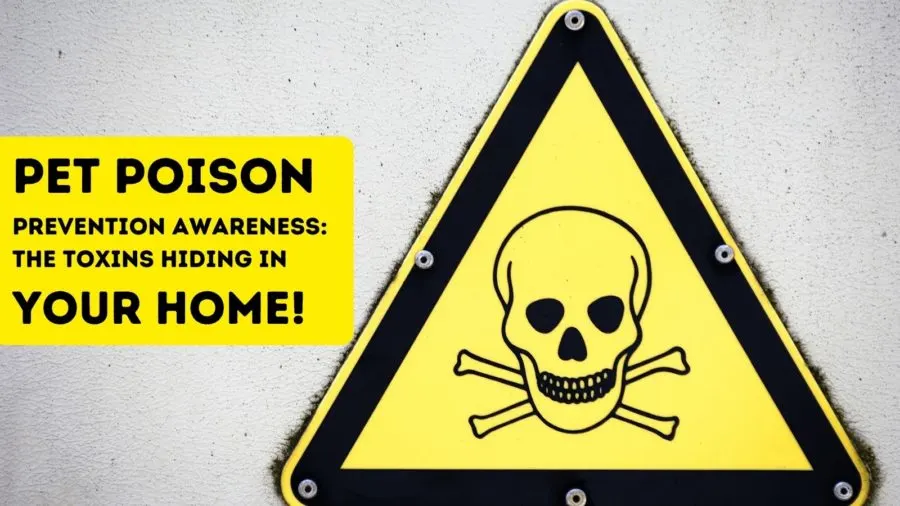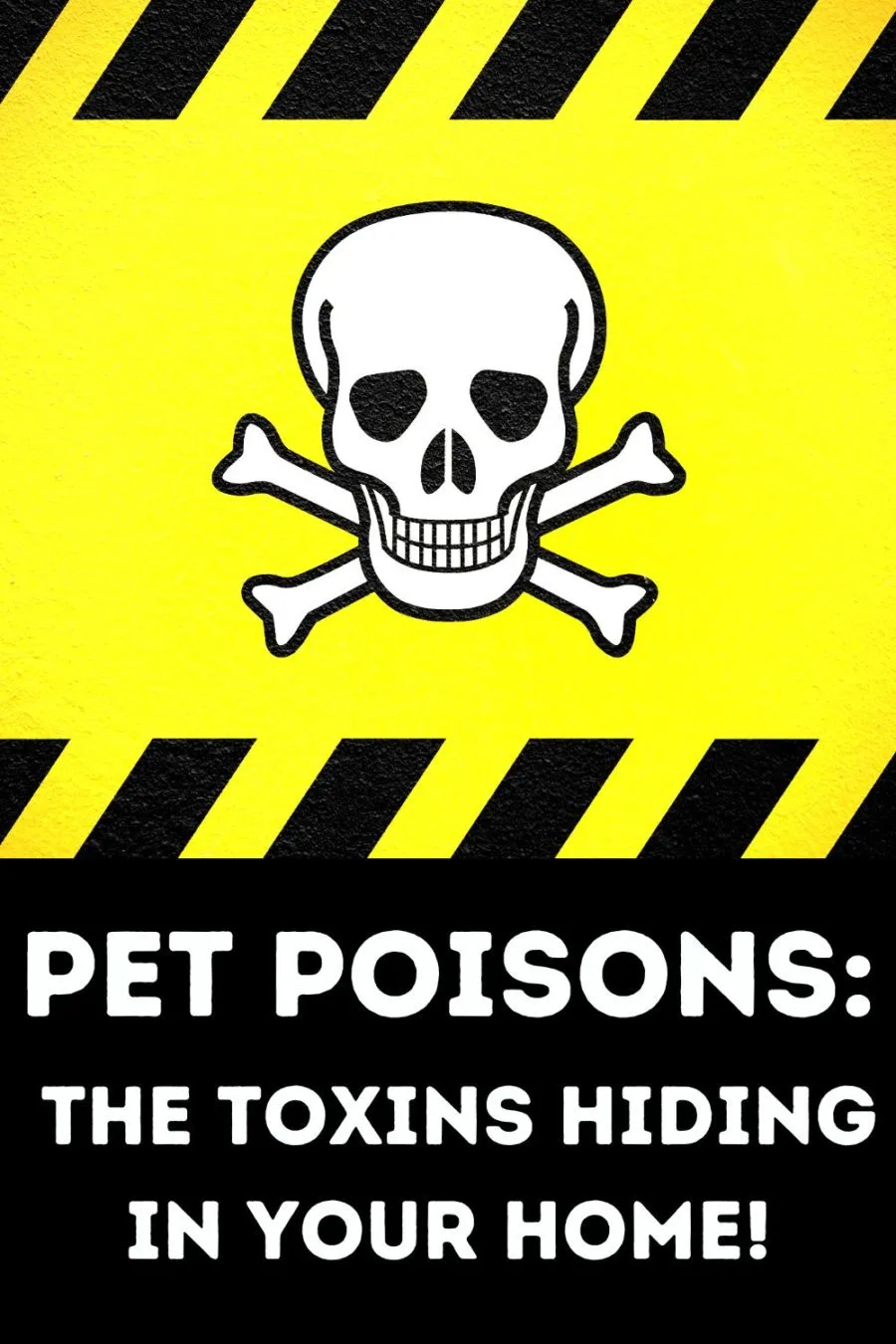Every March, the attention of the media turns to the many toxins our homes contain–both for people and for pets. National Animal Poison Prevention Week, National Poison Prevention Week and National Poison Awareness Month each help shine the spotlight on the dangerous substances that are toxic to our dogs, cats, other animals–and the people in our lives.
Please take a few moments to look over this list and think about your own home, car, and other locations your dog can access.

When is National Animal Poison Prevention Week?
National Animal Poison Prevention Week is held the third week in March every year to coincide with National Poison Prevention Week.
National Poison Prevention Week was established in 1961 by Congress; the first National Poison Prevention Week was observed by President John F. Kennedy in 1962. The awareness week is always scheduled for the third week in March.
National Poison Awareness Month is observed during the month of March.
The Five Most Common Pet Toxins
The Pet Poison Helpline released a list of the top five toxins that make up the majority of their calls:
Human Medications
43 percent of calls to Pet Poison Helpline regarding dogs that ate over-the-counter (OTC) or prescription medications.
The majority of them involved antidepressants such as Prozac, Paxil, Celexa and Effexor.
Of all medications, antidepressants account for the highest number of calls to Pet Poison Helpline, and can cause neurological problems like sedation, lack of coordination, agitation, tremors and seizures.
Common drugs including NSAIDs (e.g. Advil®, Aleve® and Motrin®), acetaminophen (e.g. Tylenol®) and antidepressants (e.g. Effexor®, Cymbalta®, Prozac®) can cause serious harm to dogs and cats when ingested. NSAIDs such as Advil can cause stomach and intestinal ulcers as well as kidney failure, especially in cats. A single Tylenol tablet containing acetaminophen can be fatal to a cat, and in dogs, a larger ingestion can lead to severe liver failure.
Prescription ADD/ADHD medications, amphetamines such as Adderall, Concerta, Dexedrine, and Vyvanse, can cause tremors, seizures, cardiac problems and death in pets.
Human Foods
16 percent of calls were for dogs that helped themselves to foods that are safe for humans, but poisonous for dogs.
Chocolate
The most prevalent cases were for dogs that ate chocolate. Dark chocolate is the most dangerous since it contains high amounts of theobromine – a relative of caffeine that can be deadly.
Bakers and dark chocolate are the most toxic, and milk chocolate if ingested in large amounts.
Xylitol
Xylitol, a sweetener in sugarless gums and candies, is also very dangerous and can be life-threatening even when ingested in small amounts.
Many people carry chewing gum and don’t realize that, if ingested by a dog, it can be fatal. Most sugarless gums, including some Trident™, Orbit™, and Ice Breaker™ brands, contain xylitol, a sweetener that is toxic to dogs.
Some sugarless mints and flavored multi-vitamins may also be made with xylitol. When ingested, even small amounts of xylitol can result in a life-threatening and rapid drop in blood sugar, and if large amounts are ingested, dogs can suffer from severe liver failure.
Signs of xylitol poisoning include vomiting, weakness, difficulty walking, collapse, tremors and seizures. Liver damage and bleeding up to 12 hours after ingesting xylitol can also occur.
If your dog eats a product with xylitol, it can take several days in hospital before his blood sugar levels stabilize. The outcome isn’t as good that develop liver damage or bleeding.
Raisins and grapes
Raisins and grapes are often overlooked by dog owners as potentially dangerous, but they are extremely toxic and can cause kidney failure.
Other human foods toxic to dogs include macadamia nuts, garlic, onions, yeast-based dough and table salt.
Insecticides
7.5 percent of calls for dogs were because they ate insecticides in the form of sprays, granules, insect bait stations and more.
While many household insecticides are well tolerated by dogs, certain potent types such as organophosphates (often found in rose-care products), can be life-threatening even when ingested in small amounts.
Rodenticides
6.5 percent of calls for dogs were for dogs that got into mouse and rat poisons, which contain various active ingredients that are poisonous to dogs.
Depending on the type ingested, poisoning can result in moderate to severe symptoms. These may cause internal bleeding (brodifacoum, bromadiolone, etc.) or brain swelling (bromethalin), even in small amounts as well as kidney failure and seizures.
Only one type of mouse poison (anticoagulant or blood thinner) has an antidote to counteract the effects of the poison.
The rest, unfortunately, have no antidote and are more difficult to treat. There is also potential for relay toxicity, meaning that pets and wildlife can be poisoned by eating dead rodents that were poisoned by rodenticides.
Zeev Dorfman, co-owner of Rodents Stop, shares these tips for pet owners who want to take proactive steps to prevent a rodent infestation.
- If the residence has a doggy door – be sure to use one that has strong magnets – so dogs can get through, but it keeps rodents out of the house.
- Keep all pet food and water inside of the house – be sure to pick up the food and store it in airtight containers at night.
- Be sure all doors and screens properly close and are sealed tight.
- Pick up dog poop in your yard regularly.
Dietary Supplements and Vitamins
5.5 percent of calls were concerning dogs that ingested dietary supplements and vitamins.
While many items in this category such as Vitamins C, K, and E are fairly safe, others such as iron, Vitamin D and alpha-lipoic acid can be highly toxic in overdose situations.
Additionally, Pet Poison Helpline has managed several cases involving xylitol poisoning from sugar free multi-vitamins.
Additional Dangers to Your Dog You May Have in Your Purse
Along with the medications listed above, the following items commonly found in purses are toxic to dogs. Purses left lying around pose temptations to dogs so please be sure your purse–or your guest’s–is out of reach of your dog.
Asthma inhalers (albuterol)
While asthma inhalers are often used in veterinary medicine for cats and dogs, when accidentally chewed and punctured by dogs, they can cause severe, life-threatening, acute poisoning.
Because inhalers often contain concentrated doses (often 200 doses in one small vial) of beta-agonist drugs (e.g., albuterol) or steroids (e.g., fluticasone), dogs that chew into them are exposed to massive amounts of the drugs all at once.
This can lead to severe poisoning, resulting in life-threatening heart arrhythmias, agitation, vomiting, collapse and death.
Cigarettes
As few as three cigarettes can be fatal to a small dog, depending on the strength or “lightness” of the cigarettes.
After ingestion, clinical signs of distress can become apparent in as little as 15 minutes. Cigarettes, chewing tobacco, and even gum (Nicorette®) contain nicotine, which is toxic to dogs and cats.
Exposure causes high heart and respiratory rates, neurological overstimulation, uncontrolled urination/defecation, tremors, seizures, paralysis and death.
E-cigarettes or vapes are also extremely toxic to pets.
Hand Sanitizer
In recent years, hand sanitizer has become a common item in millions of handbags. Many hand sanitizers claim to kill almost 100 percent of germs, and this possible because they contain high amounts of alcohol (ethanol) – sometimes up to 95 percent. Therefore, when a dog ingests a small bottle of hand sanitizer, it can have the same effect as a shot of hard liquor. This can cause a severe drop in blood sugar, incoordination, a drop in body temperature, neurological depression, coma and death.
Whether you are the host or a guest at a holiday party, be sure that purses are placed in a safe location and out of the reach of pets. When in doubt, hang it up.
Additional Dangers
The Pet Poison Helpline also lists these frequent causes for calls:
- Insect bait stations: These rarely cause poisoning in dogs – the bigger risk is bowel obstruction when dogs swallow the plastic casing.
- Glucosamine joint supplements: Overdose of tasty products such as Cosequin and Move Free typically only cause diarrhea; however, in rare cases, liver failure can develop.
- Over the counter cough, cold and allergy medications: Those that contain acetaminophen or decongestants, such as pseudoephedrine or phenylephrine, are particularly toxic.
- Silica gel packets and oxygen absorbers: Silica gel packs, found in new shoes, purses or backpacks, is rarely a concern. The real threats are the iron-containing oxygen absorbers found in food packages like beef jerky or pet treats, which can cause iron poisoning.
What To Do If Your Pet Has Ingested a Harmful Substance
If you think your pet may have ingested something harmful, take action immediately.
Contact your veterinarian.
Can’t reach your veterinarian? These hotlines can help:
- Call the Pet Poison Helpline at 1-800-213-6680. Pet Poison Helpline charges a fee per call; this includes unlimited follow-up consultations. Pet Poison Helpline, an animal poison control center based out of Minneapolis, is available 24 hours, seven days a week for pet owners and veterinary professionals that require assistance treating a potentially poisoned pet. The staff provides treatment advice for poisoning cases of all species, including dogs, cats, birds, small mammals, large animals and exotic species.
- Call the ASPCA Animal Poison Control Center a call at (888) 426-4435 (there is a consultation fee for calls). The center is available for calls 24 hours a day, 365 days a year.
Pin it to remember Pet Poison Prevention Awareness: The Toxins Hiding in Your Home!

- Review: Jimmy BX7 Pro Anti-Mite Vacuum Cleaner - December 16, 2024
- 🎉 GIVEAWAY: Lord of the Pets Portrait of Your Dog! - November 26, 2024
- Review: Lord of the Pets Portraits - November 17, 2024
